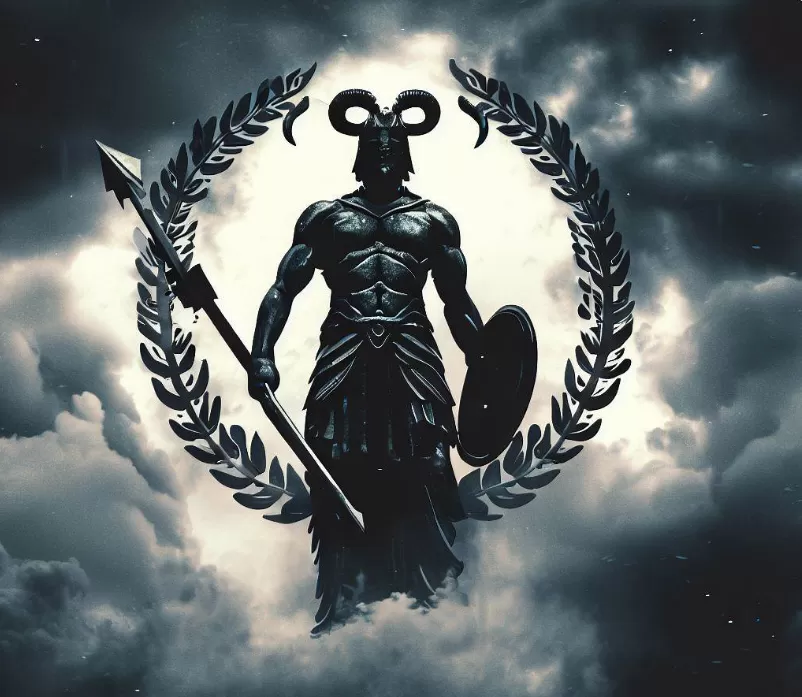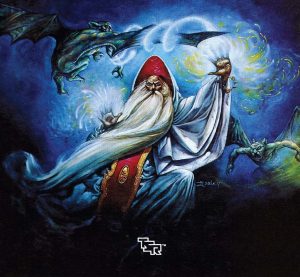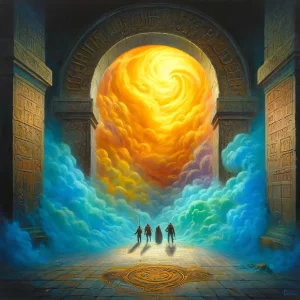
Ares, often known as the God of War, is a complex and fascinating figure in Greek mythology. As one of the twelve Olympian gods, his influence and reputation spread across the whole of the ancient Greek world, inspiring both reverence and fear among mortals and immortals alike.
Born from the union of Zeus, the king of the gods, and Hera, the queen, Ares embodies the untamed, chaotic, and destructive aspects of war. Unlike his sister Athena, who represents strategic warfare and wisdom, Ares personifies the bloodlust, violence, and raw physical power found on the battlefield.
The figure of Ares is multi-dimensional, though he is most often associated with discord and strife. He is depicted as a handsome but cruel and aggressive deity, delighting in the tumult of war and conflict. Ares was known for his quick temper and fierce nature, often rushing into battle without a strategy, driven by his love for the chaos of war.
Ares had many children, most of whom were symbolic of the different elements of war and conflict. For instance, with the love goddess Aphrodite, he fathered Harmonia, the goddess of harmony and concord, as well as Phobos and Deimos, the gods of fear and terror. Other offspring of Ares include Eros (god of love), Anteros (god of requited love), and Adrestia (goddess of revenge), illustrating his influence over a wide range of human experiences.
Despite his divine status, Ares wasn't universally revered among the Greeks. In fact, he was often met with mixed feelings. In the city of Sparta, known for its warrior culture, Ares was celebrated as a symbol of courage and strength in war. However, in other city-states, like Athens, he was largely overshadowed by Athena, who was seen as the city's protective deity and a symbol of wisdom and just warfare.
Ares is a prominent figure in several Greek myths and epic poems. In Homer's "Iliad," Ares initially supports the Trojans in the Trojan War but later sides with the Achaeans. He often clashed with other gods, like Athena and Apollo, and wasn't always successful in his ventures. One of the most well-known tales of Ares involves his affair with Aphrodite, which was exposed by the clever god Hephaestus, Aphrodite's husband, leading to humiliation and mockery among the other gods on Mount Olympus.
Although he is a deity associated with physical prowess, Ares also had connections with animals and was known as a patron of certain creatures. In particular, the ancient Greeks associated Ares with dogs, vultures, and boars, all creatures with aggressive or scavenging tendencies that mirror the god's connection to the brutality of war.
In later times, under the influence of the Romans, Ares became identified with Mars, the Roman god of war. However, there were significant differences between the two. Mars was a more dignified figure and held a more prominent place in the Roman pantheon, being considered one of the three main Roman gods alongside Jupiter and Quirinus. Unlike Ares, Mars also had agricultural aspects and was seen as a protector of Rome and its people, further highlighting the distinction between the two deities.
Ares, the God of War, is a character of complexity and contradiction in Greek mythology. He embodies the brutal and chaotic nature of war, yet also governs over aspects of love and fear. While he might not have enjoyed the popularity of some other Olympian gods, Ares's influence over the ancient Greek world was profound, and his legacy continues to echo through the ages. His character serves as a stark reminder of the Greeks' understanding of the dual nature of existence - the violence and the peace, the chaos and the harmony, the love and the strife.






